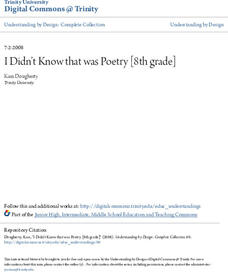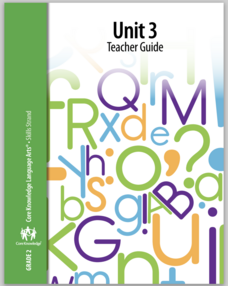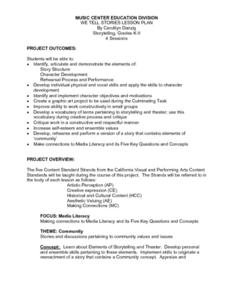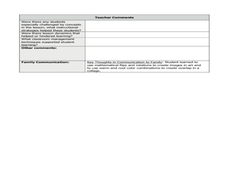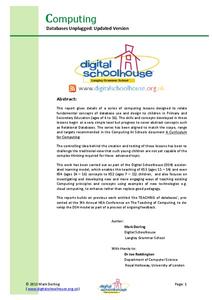iCivics
Tribal Government: High School
Did you know there are 567 federally recognized American Indian and Native Alaskan tribes and villages in the United States alone? The resource helps break down the complexities of many different tribal societies to explain the concept...
Federal Reserve Bank
The Story of the Federal Reserve System
Prevent the Federal Reserve System from becoming a dry topic for your middle and high schoolers by using an informative, engaging resource! The cartoon takes your class on a journey with aliens from the planet of Novus to observe the...
Cornell University
Polymers: Instant Snow
Is it easy to make snow? Scholars use critical thinking skills as they investigate the concept of polymers by making snow. The class tests several different variables and takes measurements over the course of several days. They then...
Pace University
Grade 6-8 Living Things
What characterizes a living thing? Scholars explore the concept during a differentiated instruction unit on living things. They perform lab experiments to determine how animals adapt to stimuli, watch videos and learn about...
EngageNY
Grade 5 Math Module 1, Topic A, Lesson 1
Extend the place value system. The first lesson plan in a series of 18 extends the place value system to millions through thousandths. Using place value charts, pupils see how the value of a digit changes as it moves places. Teachers use...
EngageNY
Grade 5 Math Module 1, Topic A, Lesson 2
What are the place value patterns? An informative lesson plan helps scholars build upon their knowledge of place value to see patterns when multiplying and dividing by powers of 10. Classmates begin the second installment by reviewing...
Nemours KidsHealth
Keep Your Brain in the Game: Grades 3-5
Boost physical activity as well as concept proficiency with brief bursts of movement. Before taking a test, scholars vote on five exercises to complete from a set of 8 cards. After two minutes, learners begin their work with heightened...
Health Smart Virginia
Social Emotional Skills Lessons Overview
Sometimes the hardest part of planning any unit of instruction is determining the activities that reinforce the concepts of the lessons and support the development of student skills. This first resource in the Health Smart series...
Health Smart Virginia
Mental Health/Social Emotional Skills
A 7-page packet of activity ideas, lesson plans, and information resources provides instructors of high school freshmen a wealth of materials to support teaching the concepts in a Health Smart unit.
Trinity University
I Didn’t Know that was Poetry
Poetry or prose? That is the question facing middle schoolers as they begin a month-long poetry unit by examining the characteristics that differentiate poetry and prose writing. Pupils learn about poetic devices and different types of...
Core Knowledge Foundation
Farms Tell It Again!™ Read-Aloud Anthology
The thematic read-aloud anthology introduces young readers to life on a farm. The thoughtfully detailed resource offers three weeks of skills practice designed to boost reading comprehension skills. Lessons follow a routine of...
Core Knowledge Foundation
Kindergarten Skills Unit 4
Fifteen lessons make up a unit that focuses on letter-sound correspondence. Beginning readers examine letters and their sounds. Scholars complete a review, an engaging activity, watch teacher modeling, and practice concepts. Lessons are...
Core Knowledge Foundation
Kindergarten Skills Unit 7
A unit consists of seventeen lessons that examine six new consonant digraphs. Lessons review past concepts, introduce sounds and spelling, and offer differentiated instruction in small groups. Learners begin reading a decodable story and...
Core Knowledge Foundation
First Grade Skills Unit 3
Four weeks, 19 lessons—this unit covers five new vowel spelling patterns, tricky words, spellings, verb tenses, reading fables and exploring the writing process. Lessons offer review, an introduction to the concept, skills practice,...
Core Knowledge Foundation
Second Grade Skills Unit 3: Kids Excel
The unit offers second graders skills practice in tricky spelling and words, grammar—nouns and punctuation, reading decodable texts, and writing a personal narrative. Lessons begin with a warm-up and go into a concept review, word work,...
Curated OER
How Gear Systems Work: A Research Project
Students apply information regarding simple machines along with the math concept "ratios." The teacher introduces the concept that technology is the application of scientific knowledge and mathematics concepts to solve a problem. This is...
Curated OER
Crazy for Cubes: Art and Science
Learners discuss Sol LeWitt and conceptual art, then analyze the differences in expressing a concept through model-based inquiry and aesthetic art criticism. They develop a geometric, scientific, or mathematical concept, then create an...
Achievement Strategies
Unit/Chapter Design Template
A thorough lesson plan template allows teachers to design balanced and standards-based lessons for any grade. The template includes spaces for unit vocabulary and concepts, objectives, and additional resources.
Curated OER
We Tell Stories
Young readers bring characters to life by working in small groups to script and perform stories that contain a community concept. Detailed questions and activities are outlined for the class. Consider having your groups create...
Curated OER
Population Biology Case Study
Students are focused on the big question: What makes a population grow and how could that growth stop? They use these concepts to help answer the big question: carry capacity, density dependent v. density, independent factors, predation...
Curated OER
Geometric Collages
Fourth graders investigate the concept of geometric patterning. They create their own patterns with a few basic requirements. The patterns must illustrate the concepts of flipping, 90 and 180 degree rotations. The collages also consist...
Novelinks
The House of the Scorpion: Anticipation Guide
Introduce Nancy Farmer's award-winning science fiction novel, The House of the Scorpion, with an anticipation guide that asks readers to agree or disagree with a series of statements that reflect the major concepts in the story. Follow...
Computer Science Unplugged
Computing: Databases Unplugged
How do databases store and retrieve information? The activities in the resource provide fundamental concepts of databases by introducing an approach that teaches the basics without using computers. The pupils act as the actual data that...
EngageNY
Mid-Module Assessment Task: Grade 8 Module 2
It's time for a concept check! Check for student understanding over the three types of rigid transformations. The assessment follows the first 10 lessons in this series and to test pupils' proficiency of these concepts. Individuals...











